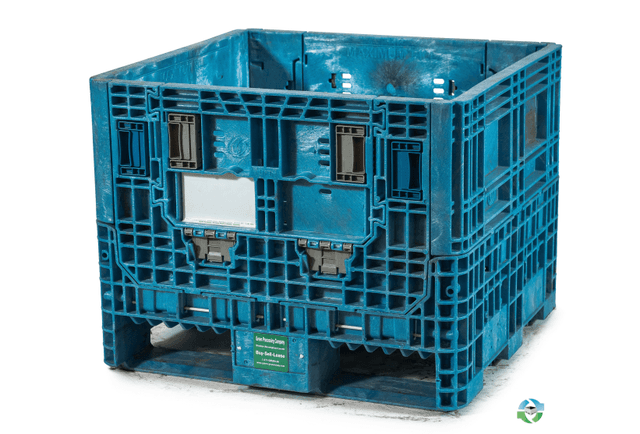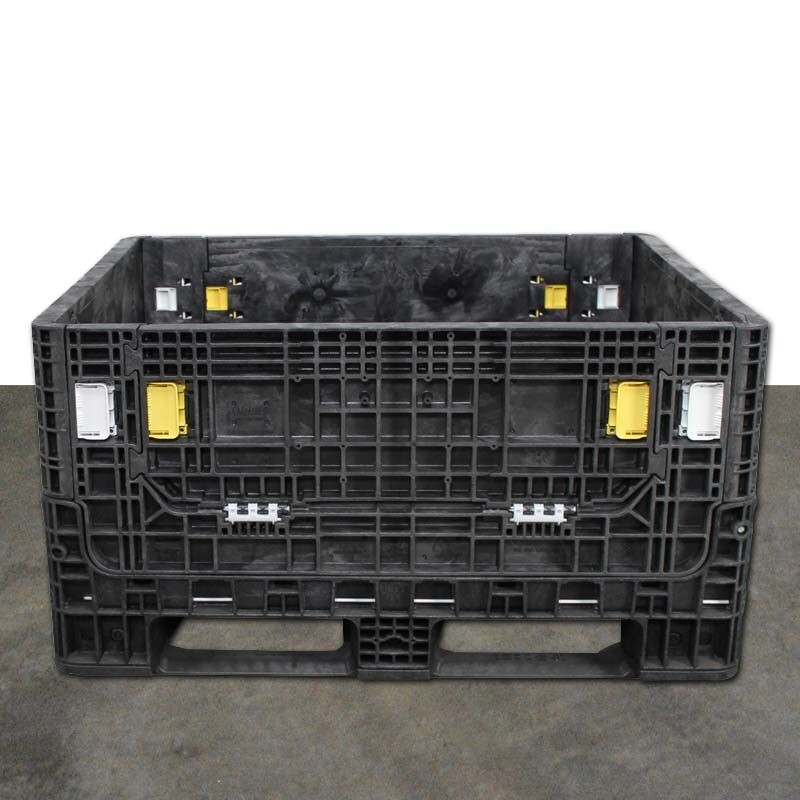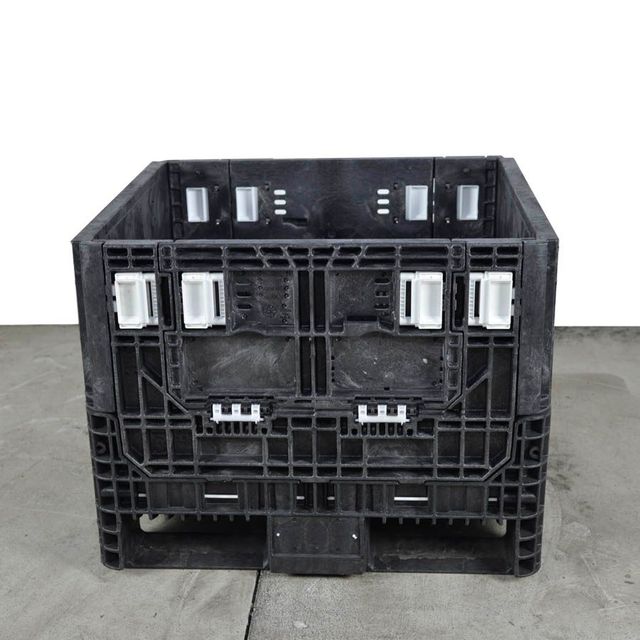Learn how used collapsible containers help optimize your supply chain flow
Why Mass Containers Are Crucial for Economical and lasting Transport
Mass containers play a necessary function in modern logistics. They promote the reliable motion of big quantities of items, consequently enhancing transportation procedures. This technique not just lowers expenses but additionally lessens ecological impact with lower discharges and waste generation. As industries seek more sustainable techniques, the fostering of bulk containers is becoming progressively substantial. What ramifications does this shift hold for future logistics and supply chain administration?

The Benefits of Making Use Of Bulk Containers in Logistics
Bulk containers change logistics by enhancing performance and sustainability. These containers permit the transportation of large amounts of items in a single trip, markedly minimizing the number of trips required. This not just enhances procedures however additionally lessens labor prices connected with handling, loading, and unloading. Additionally, mass containers are made to maximize area usage within transport vehicles, ensuring that even more products can be shipped simultaneously.
The standardization of bulk containers also simplifies the logistics process. With uniform dimensions, they can be quickly piled and kept, bring about improved storage facility monitoring. Mass containers often include long lasting materials that secure contents from damages during transportation, thus reducing item loss and enhancing overall integrity. Consequently, companies can experience enhanced supply chain efficiency, eventually leading to raised earnings and customer complete satisfaction. This combination of elements makes mass containers a crucial possession in modern-day logistics.
Environmental Influence: Minimizing Waste and Carbon Footprint
As sectors significantly prioritize sustainability, the adoption of bulk containers has become a crucial technique for minimizing waste and decreasing carbon impacts. These containers lessen using product packaging products, such as boxes and plastic, therefore significantly decreasing total waste generation. By combining deliveries, mass containers boost transportation efficiency, allowing for even more products to be transported per trip. This decrease in journeys straight correlates with lower greenhouse gas emissions, adding to a smaller sized carbon footprint.
Bulk containers can typically be recycled or recycled, additionally minimizing environmental influence. The sturdiness of these containers guarantees they can endure numerous transport cycles, decreasing the requirement for single-use alternatives. used bulk containers. By improving logistics and promoting effective resource use, mass containers not only sustain lasting techniques yet additionally urge sectors to straighten with global environmental objectives. Eventually, their execution shows a commitment to environmental stewardship and accountable source monitoring
Price Financial Savings: Just How Mass Containers Lower Transport Costs
While numerous business seek methods to boost their lower line, the usage of bulk containers offers a considerable possibility for reducing transportation expenses. Bulk containers make best use of the quantity of products delivered, allowing businesses to ship bigger quantities at the same time. This efficiency minimizes the number of journeys needed, directly decreasing fuel prices and reducing labor expenditures connected with loading and dumping.
Additionally, bulk containers typically feature streamlined layouts that enhance space utilization within transportation automobiles. This implies fewer voids, causing a lot more effective usage of available ability. Furthermore, the sturdiness of mass containers can decrease the danger of product damage throughout transit, guaranteeing and lowering losses that more products get here undamaged.
Enhancing Supply Chain Effectiveness With Mass Storage Solutions
Bulk storage options play an important role in improving supply chain performance by optimizing stock management. By settling items into fewer, larger containers, services can significantly decrease managing prices connected with constant transfers and processing. This streamlined method permits for far better tracking and administration of stock, inevitably leading to enhanced functional efficiency.
Structured Supply Monitoring
Reliable inventory management is necessary for maximizing supply chain operations, particularly when organizations take on bulk storage space remedies. These remedies make it possible for services to keep higher stock degrees while minimizing the regularity of replenishment. By settling products into bulk containers, business can enhance their supply procedures, reducing the intricacy connected with tracking numerous smaller bundles. This strategy facilitates precise stock counts and enhances forecasting precision, permitting for more educated decision-making. In addition, bulk storage space services streamline storehouse company, making it less complicated to situate and gain access to items when needed. As a result, companies can accomplish an extra reliable stock turnover price, inevitably improving overall supply chain efficiency and reducing the chance of stockouts or overstock scenarios.

Decreased Handling Costs
The execution of bulk storage space solutions not only streamlines stock management yet also substantially reduces managing prices across the supply chain. By settling materials right into bulk containers, firms minimize the requirement for regular handling and transfer in between various storage and transport devices. This method reduces labor prices associated with loading, discharging, and moving smaller bundles. In addition, mass storage reduces the frequency of shipments, bring about reduced transportation prices and decreased gas usage. As an outcome, companies can enhance their logistics procedures, permitting for an extra reliable appropriation of sources. Inevitably, lowered handling prices contribute to enhanced overall supply chain performance, cultivating a setting that sustains both sustainability and economic viability.

Adaptability of Bulk Containers Across Numerous Industries
Although many sectors have distinctive demands for transport and storage space, bulk containers have become a versatile remedy that fulfills a large range of demands. These containers, ranging from big containers to specialized containers, can fit varied products, consisting of powders, fluids, and granules. In the farming sector, mass containers facilitate the transport of grains and plant foods, while the food and drink industry uses them for components and completed products. The chemical market depends on mass containers for safely moving unsafe products, ensuring conformity with safety and security laws. Additionally, building and construction companies take advantage of bulk containers for transferring aggregates and various other products. Their versatility reaches different modes of transportation, consisting of ships, trucks, and trains, enhancing logistical efficiency. This convenience not just improves operations across different fields yet additionally advertises sustainability by decreasing product packaging waste and maximizing area in transit. Mass containers play a vital role in modern-day supply chain administration.
Future Trends wholesale Container Use and Sustainability
The future of mass container use is progressively shaped by cutting-edge materials advancement that improves sustainability. Additionally, automation in logistics promises to streamline procedures, reducing waste and boosting performance. Embracing circular economic climate techniques will better transform exactly how bulk containers are designed, used, and recycled, promoting a much more lasting transport landscape.
Ingenious Products Development
As industries increasingly prioritize sustainability, innovative products development in mass containers emerges as a considerable consider improving eco-friendly transportation remedies. Suppliers and scientists are discovering eco-friendly plastics, recycled composites, and light-weight metals to reduce environmental effect. These materials not just decrease waste however likewise improve gas performance by decreasing the overall weight of containers. Furthermore, innovations in wise products, which can adjust to varying problems, improve the sturdiness and capability of mass containers. The integration of these ingenious products aligns with round economic climate principles, promoting reuse and recycling. As the demand for sustainable methods expands, the development of such products will certainly play a crucial function in shaping the future of bulk container use in logistics and transportation.
Automation in Logistics
Significant innovations in automation are positioned why not try here to transform logistics and the usage of mass containers, enhancing sustainability in transport. Automated systems, including drones and independent automobiles, are enhancing the activity of bulk containers, lowering the dependence on traditional fuel-powered transportation. These innovations maximize routing and packing processes, enhancing and decreasing vacant miles fuel efficiency. Furthermore, automated inventory administration systems enhance tracking and tracking of mass containers, making sure better resource allowance and decreased waste. The assimilation of the Net of Points (IoT) enables real-time information evaluation, making it possible for proactive decision-making that lines up with sustainability goals. As automation continues to progress, it is anticipated to drive further innovations wholesale container use, inevitably sustaining more sustainable logistics methods and decreasing the environmental impact of transportation.
Round Economic Situation Practices
Innovations in automation are setting the stage for an extra incorporated click here to read technique to circular economy practices in the domain of bulk container usage. As industries significantly accept sustainability, mass containers are being made for longevity and reusability. This shift not only minimizes waste but likewise improves source effectiveness. Companies are embracing strategies such as closed-loop systems, where used containers are accumulated, reconditioned, and reintroduced into the supply chain. Furthermore, wise innovations track container life process, assisting in far better management and minimizing ecological impact. The partnership between suppliers, logistics providers, and end-users is vital in developing criteria for sustainable container use. used plastic containers. Future trends suggest a growing focus on materials that are recyclable and naturally degradable, more reinforcing the circular economy's principles in bulk transport

Regularly Asked Questions
What Products Are Bulk Containers Generally Made From?
Mass containers are usually created from long lasting products such as high-density polyethylene, light weight aluminum, cardboard, and steel. These materials supply protection, convenience, and stamina, making them appropriate for delivering numerous products in various markets efficiently.
How Do I Pick the Right Dimension Bulk Container?
Picking the best dimension bulk container involves examining the quantity of products to be moved, considering managing devices compatibility, and assessing storage area demands. Correct dimension warranties performance in transport and minimizes waste during shipment.
Are Bulk Containers Reusable or Recyclable?
Bulk containers are typically recyclable, created for numerous journeys, boosting sustainability. Several can additionally be recycled, relying on the products used. Selecting recyclable choices even more decreases and supports ecological goals waste in transport techniques.
What Security Regulations Apply to Mass Container Transportation?
Safety and security laws for mass container transportation consist of compliance with the Division of Transport standards, appropriate labeling of hazardous products, structural honesty analyses, and adherence to weight restrictions to ensure safe handling and prevent crashes throughout transit.
How Can Businesses Change to Utilizing Mass Containers Efficiently?
Services can change to bulk containers by reviewing present logistics, educating staff on handling, spending in suitable devices, maximizing inventory monitoring, and collaborating with distributors to guarantee compatibility and effectiveness throughout the supply chain.
As sectors progressively focus on sustainability, the fostering of bulk containers has actually arised as a vital my site technique for lowering waste and lowering carbon impacts. By settling materials into mass containers, companies can improve their stock procedures, decreasing the intricacy linked with tracking multiple smaller sized plans. As industries significantly prioritize sustainability, ingenious products development in bulk containers emerges as a significant aspect in enhancing green transportation options. Automated systems, including drones and self-governing vehicles, are enhancing the activity of bulk containers, decreasing the dependence on standard fuel-powered transportation. In addition, automated inventory administration systems boost monitoring and monitoring of bulk containers, making sure far better resource allotment and decreased waste.